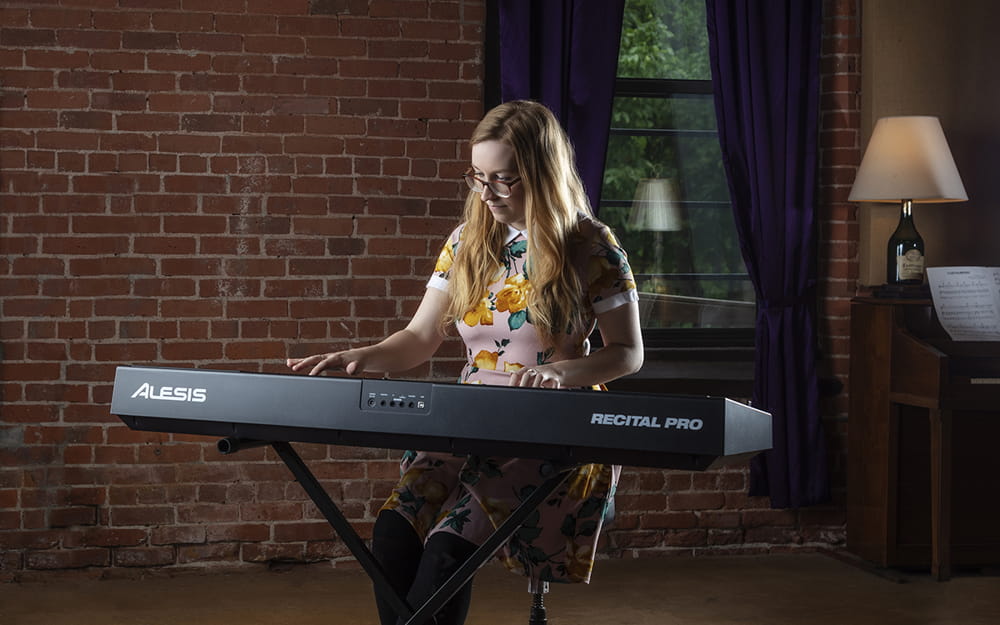Comparing the first models of digital pianos to show up on the market can be very helpful for musicians who are looking for an instrument, but aren’t sure which one would be best for them. That’s why we’ve decided to compare two almost identical instruments – Alesis Recital Pro and Yamaha p71.
Both of these music devices offer a full keyboard with 88 weighted keys and a classic piano sound – one expected from a high quality electric piano or a gran acoustic piano. So, which one should you choose? They both have their advantages and disadvantages. They also vary in prices and dimensions. This article will provide you with all necessary information to help you make the right choice when buying your new digital piano! Before we move on to the differences in specs, let’s take a look at the technical aspect of both models.
About The Alesis Recital Pro
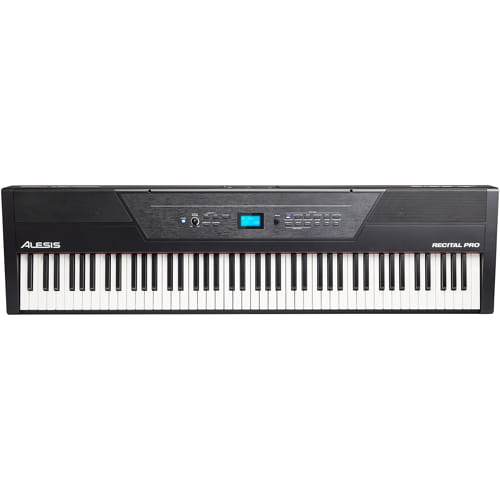
The Alesis Recital Pro is one of the most popular digital pianos on the market. This model has received very positive feedback on Amazon, where it’s available for sale. The Alesis Recital Pro is a high quality 88-note, velocity sensitive keyboard with fully weighted keys. With an assortment of inputs and outputs it offers flexibility as a main controller or as part of a larger setup. The key action feels realistic due to the velocity-sensitive, semi-weighted keys. It has built-in sounds including 8 voices, 11 demo songs and 32 polyphonic tones. Also, it provides an output for headphones and two outputs for speakers (3W + 3W).
The Alesis Recital also acts as a computer audio interface with 1/4″ balanced output connectors for use with other powered monitors, a headphone output and an auxiliary input for MP3/ CD players. Overall a great Pinao, it is a great option for experts and beginners alike.
Key Features
- 88-note velocity sensitive synth action keyboard.
- Variable touch weight and fall-back can be set for 3 sensitivity levels within the Keyboard Setup menu.
- 16 fully assignable trigger pads with rim shots, open and close hi-hat cymbal articulations.
- 8 assignable faders, 8 assignable buttons, 8 assignable 360-degree knobs
- 16 velocity and pressure sensitive pads (velocity, note repeat) for performance.
About The Yamaha P71
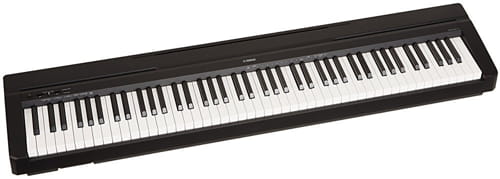
The Yamaha P71 is a 61-note, velocity sensitive digital piano. Like any other piano keyboard in their P series, it offers the Yamaha Education Suite so you can create your own songs and lessons. This digital piano is one of the best pianos for beginners. Its comes with 88 fully weighted keys that are fully responsive and provide a real acoustic piano feel. The Graded Hammer Standard action on the piano simulates the weight of each note, letting you perform like an expert! An extra touch shift feature expands your range, giving you access to the entire 88 keys.
The Yamaha p71 piano also comes with a wide range of buttons and controls – there’s one for every function: 1/4″ audio output, headphone output, sustain pedal input and USB port. Just plug your instrument in and you’re ready to go! The included sustain pedal brings out the best sounds from the built-in speakers.
Key Features
- 61 full size, velocity sensitive keys
- 4 track sequencer with 100 different songs to play along with
- Built in speakers and MIDI connectivity with other devices
Alesis Recital Pro Vs. Yamaha P71: Design And Connectivity
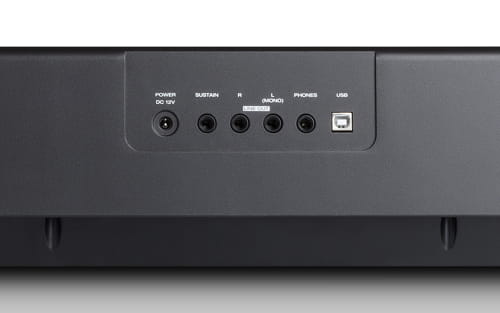
Winner: Tie For Design and Alesis Recital Pro For Connectivity
The Alesis Recital Pro and Yamaha P71 both look like fantastic digital pianos with great keyboards for beginners. The Yamaha p71 has a sleek black design complete with rubber feet and the Alesis does as well with its attractive wood finish.
The Alesis has 1/8″ TRS balanced audio outputs for use with powered studio monitors and the headphone output connects to most headphones. The Yamaha has ¼” mono audio outputs (unbalanced) for use with unpowered studio monitors, a headphone jack and an auxiliary input for MP3 players. Playing it feels just like playing those pro acoustic pianos, making the whole experience amazing.
Alesis Recital Pro Vs. Yamaha P71: Size And Weight
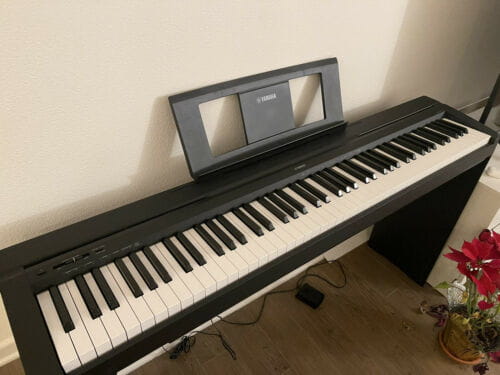
Winner: Tie
The Yamaha has a 61-key keyboard while the Alesis has an 88-key keyboard. Both of these make for perfect beginner digital pianos, with keyboards that are of medium size, great for all piano lessons (about 590mm [23.2″] for the Yamaha and 1244mm [48″] for Alesis)
The Yamaha is lighter at 4.9 kg [10 lbs] while the Alesis is 5.5 kg [12 lbs]. This means that it will be a bit more portable for taking to lessons and performances.
Alesis Recital Pro Vs. Yamaha P71: Keyboard And Keys
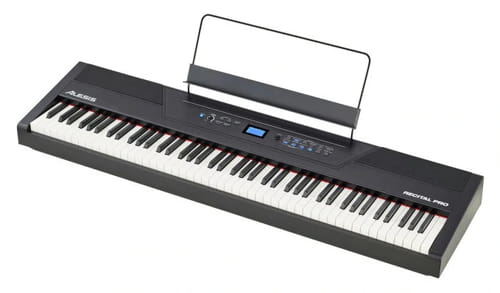
Winner: Alesis Recital Pro
The Alesis has a more realistic key action with its hammer effect. This is due to the fact that it’s going into a spruce wooden soundboard, while the Yamaha uses plastic keys and a metal back plate. Both the Alesis and the Yamaha have weighted keys.
The weighted keys on the Alesis are better with their hammer effect since they go into a wooden soundboard while the keys of the Yamaha are made of plastic and go into a metal backplate.
Alesis Recital Pro Vs. Yamaha P71: Sound And Speakers
Winner: Yamaha P71
The Yamaha comes with 256-note polyphony, while the Alesis only has 32-note polyphony. This means that the Yamaha can process more notes at once and gives it a more authentic sound.
The Alesis has a built-in 2W x 2 stereo speaker system, while the Yamaha comes with a 3″ full range driver. The Alesis may be better for the studio environment while the Yamaha is great for playing at home with friends.
Overall Winner: Alesis Recital Pro
The Alesis Recital Pro offers a better key action and more realistic sound with its wooden soundboard. It also gives you the option of using an external audio interface to improve connectivity while the Yamaha P71 is great for beginners who can get by without. On the other hand, the yamaha is a great keyboard for the beginner who might not need all the features of the Alesis. It’s lighter and more portable which makes it easy for performance and transportation to lessons, while the heavier Alesis will stay put in your home studio
If you have any questions, please leave a comment below.

